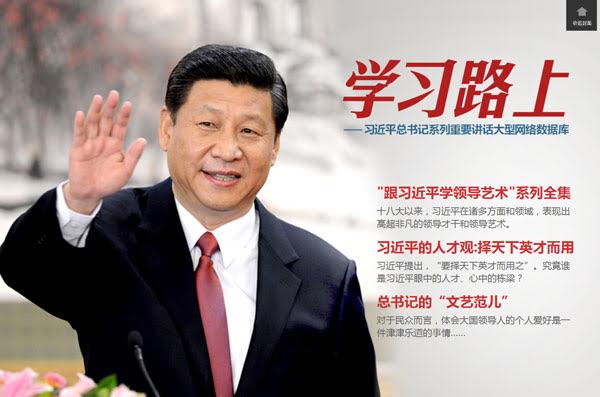Learn from President Learn
« previous post | next post »
By itself, the phrase "xuéxí lù shàng 学习路上" means "on the path / way / road" of learning. However, when you see it in large characters at the top of a lavish website devoted to the life and works of President Xi Jinping, you cannot help but think that it also punningly conveys another meaning.
Another way to parse the four characters is "xué Xí lù shàng 学习路上" ("On the way / path / road of learning from Xi").
Never mind that punning has been outlawed in China (some relevant posts and articles as of the end of 2014):
- "Punning banned in China" (11/29/14)
- "No laughing matter: China's media regulators ban puns" (12/3/14)
- "Chinese Government Moves To Crack Down On Puns" (12/5/14)
- "Nowhere to Pun Amid China Crackdown" (11/28/14)
- "LIKE A PUN IN A CHINA SHOP: Chinese media regulators crack down on puns, wordplay amid apparent state fears. The United States is stronger than that." (12/3/14)
- "When puns are outlawed …" (12/9/14)
I doubt that the Chinese communist government will ever be able to outlaw the ubiquitous injunction to "hǎohǎo xuéxí tiāntiān xiàngshàng 好好学习 天天向上" ("Study hard and make progress every day"), which has been enshrined in this immortal Chinglish translation:
- "Good good study; day day up" (1/14/14)
The concept of xuéxí 学习 "learn; study" is sanctified for both Confucians and Chinese Communists by virtue of its derivation from verse 1 of chapter 1 of the hallowed Analects (here in the Victorian translation of James Legge):
Zǐ yuē:`Xué ér shí xí zhī, bù yì yuè hū? Yǒu péng zì yuǎnfāng lái, bù yì lè hū? Rén bù zhī ér bù yùn, bù yì jūnzǐ hū?'
子曰:「學而時習之,不亦說乎?有朋自遠方來,不亦樂乎?
The Master said, "Is it not pleasant to learn with a constant perseverance and application? Is it not delightful to have friends coming from distant quarters? Is he not a man of complete virtue*, who feels no discomposure though men may take no note of him?"
[*VHM: "jūnzǐ 君子" is often translated into English as "superior man; gentleman; person of noble character; man of honor"]

John Swindle said,
September 13, 2017 @ 10:37 pm
The anodyne phrase plus the picture are enough to set up the pun, and the immediate repetitions of Xi's name in red below that emphasize the point. The creators of the website must have known what the effect would be.
flow said,
September 14, 2017 @ 8:55 am
Just a thought: In a country where punning is prohibited, and President's name is 习, if I wanted to publish a text about learning, 学习, and I had to be aware that whatever I write might be construed to refer to the President in some way because of that coincidental character, 习—would it be a wise move to write, say, 学刁, 学習 or 学昔 just to avoid that very character? It would be a situation not unlike a naming taboo (https://en.wikipedia.org/wiki/Naming_taboo) as it used to be observed in dynastic China. But today, if I were to write 好好学刁 天天向上 instead of 好好学习 天天向上 (with the same intended reading, 刁 being used as an incomplete version of 习) wouldn't I be revealing rules of censorship and restriction on free speech, which again could be used against me? I could conceivably also get in trouble for observing a taboo from imperial times, and therefore implicitly criticizing the President for being in a position or ruling the country not unlike an Emperor. So how can one today write about the subject of studying 学刁 without getting double-guessed at all? Write 读书 (not 100% the same) instead?
Anonymous Coward said,
September 14, 2017 @ 10:23 am
flow: You're safe in this particular case. The word is too entrenched in its usual sense that a pun is understood only when it is really meant (like in the OP). On the other hand, the “observing a taboo from imperial times, and therefore implicitly criticizing the President for being in a position or ruling the country not unlike an Emperor” sense will be understood by the discerning members of the public. Whether this includes the censors or not is an empirical question.
Derek B. said,
September 18, 2017 @ 11:40 am
Flow, I would agree with Anonymous Coward. I would also add, though, that the variations you suggested do not necessarily solve the problem. 习 is generally the accepted simplification of the character 習, both when it is a surname and means "study". Thus, using that form is seen as the traditional variant.
The other character you suggested 昔 is pronounced differently (Xī compared to Xí) and has a different meaning of "past/former". That may cause more confusion in the brief time before readers realize what you are trying to write. It's better to just stick with 学习 or 學習 depending on your audience or whether you prefer simplified or traditional characters.